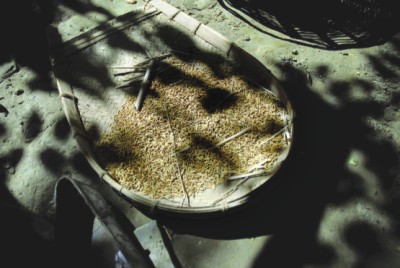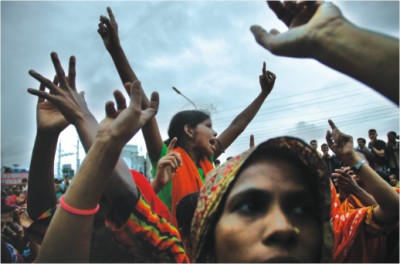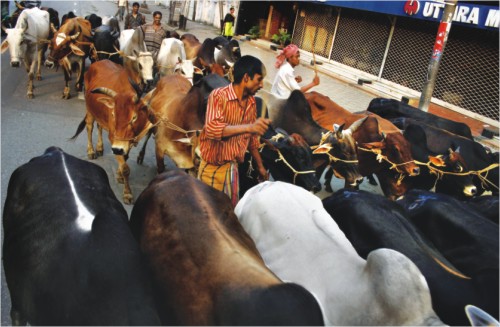
Inside
|
Myth vs. Reality Ahsan Mansur attempts to separate fact from fiction on prices
In the course of the ongoing debate, both politicians and economists outside the government have made numerous statements, in many instances blaming the non-elected nature of the government for its failures in bringing prices of essential products to earlier levels. Some have even stated that, in earlier post-flood episodes, prices were never allowed to increase because of the government's rapid actions, and attributed to the price surge to the non-representative nature of the government. Many have also asked for government intervention in the market to break the "cartel" manipulating the prices and direct interventions in the market to bring down prices. In response, the government has stepped in with BDR fair price shops and on occasions employed the joint forces to bring more "market discipline." I have been taking note of these developments closely through television and print media, albeit from a distance. As an economist, familiar with global developments and trends, I thought we must distinguish myths from reality, if we want to achieve the best possible policy response and outcome for the well-being of the Bangladeshi people. Is Bangladesh the only country experiencing such a price surge in essential commodities? Inflation in food prices is a global phenomenon, and not something we can attribute to the current government. A ton of rice, which used be sold for $230-250 last year, is currently selling for $400-500 or more. The increase in wheat prices is even more phenomenal, price per bushel which used be $2.50-3.50 for many decades, has surged to more than $10 per bushel. Similar hikes have been recorded in the prices of edible oil, milk and meat products. Recent price surges across the globe have caused food riots from Mexico to Uzbekistan to Senegal. Prices in Bangladesh certainly would not be left alone in this globalised world. We are extremely fortunate that despite two severe floods and the destruction induced by Cyclone Sidr, we did not experience any shortage of food in local markets although prices could not be insulated from international market developments. Are commodity markets in Bangladesh inefficient and need government intervention? Price movements in Bangladesh very closely follow the developments in the international markets. A news ticker in Washington informed me that wheat prices in Chicago commodity exchange have reached all-time high by crossing the benchmark of $10 per bushel, and the next day I read reports of wholesale markets in Bangladesh registering a marked increase in wheat/flour prices. The day Indian government increased the minimum export price of rice to more than $500 per ton and former Adviser Tapan Chowdhury stated that the government has nothing to do, rice prices jumped instantly both due to economic and non-economic reasons. As the government stepped in and assured the market that there is enough supply at store and in the pipeline, prices came down somewhat, albeit to levels consistent with international market prices. Has market interventions by BDR and joint forces helped? BDR shops may have been selling rice and edible oil at a few taka less than the prevailing market prices per kg, but that can be explained by the fact that government is paying for their staff salaries, rents, transports, and working capital. Do we expect the private sector to go out of business by following the steps of BDR? BDR can never change the trend in market prices, but can always sell items at a few taka less per kilogram at the expense of the government. It only serves the purpose of providing food at reduced prices at the expense of indirect/direct government subsidy, and that objective of providing food to the poor can be achieved through other channels (see below). The interventions by the joint forces have generally been very counter-productive, and led to a marked reduction of normal flow of commodities and loss of market confidence. Maintaining a large inventory level helps stabilise market, while forcing the traders to limit their inventory in the name of "hoarding" and anti-hoarding drives will certainly destabilise markets. If rice traders and millers do not build up an inventory of Aman rice, how would the market be supplied in the coming months?
To those who want to reactivate the Trading Corporation of Bangladesh (TCB), I would only ask them to remember the glorious days of TCB after the independence of Bangladesh, when it brought the worst quality products at top prices and helped plummet popularity of the Sheikh Mujib government. The idea of a price commission is also equally bankrupt in to-day's globalised world. To those skeptics who think Bangladesh private sector does not respond to price incentives, I would ask them to go to Benapole and Hili land ports and witness the long queue of trucks filled with rice and to the Chittagong port to observe the unloading of food grains from the ships. All of these are imports by the private sector large and small importers numbering in thousands from all across the country, and definitely the scenario does not point to any "cartel of importers." Is this price shock going to be reversed soon? Unlike in past epi- sodes, primary commodity price increases this time are largely demand driven and not because of supply shocks. As countries like India and China are becoming richer, the rising billions are eating better, demanding better housing, and would like to have better transports and other amenities. The resulting demand for primary products have been reflected first in surging prices of energy products and all types of metals and construction materials (steel and cement), and has now been reflected in food prices. Chinese meat consumption per person per year has increased from 44 pounds in 1985 to 110 pounds today. As we know, producing meat takes a lot of Grain -- more than 8 pounds of food grain to produce a pound of beef. At the same time, due to the sharp rise in the demand for biofuels in Brazil, the US, and Japan, prices are increasing sharply despite record levels of production. With 4 billion people attaining higher standard of living today, compared with 2.5 billion in 1975, prices of basic commodities are likely to remain high over the longer term. The idea that rice prices would come down to Tk. 10-15 level, as propagated by some political parties once they are elected back in power, is tantamount to realising the so-called golden days of Saista Khan.
Would this price shock undermine Bangladesh's food security? In today's globalised world, food security does not depend on domestic production alone. Countries in the Middle East do not have much domestic production of basic foodstuff, but there is no shortage of food supply. Given Bangladesh's current strong balance of payments position, the only country in South Asia with sizable current account surpluses in recent years, there is no reason why we should not be able to meet our food import bills. With reserves at $5.5 billion, even after a surge in import payments and slowdown in exports, there is no scope for famine in today's Bangladesh. Famine is a thing of the past, we have made strong economic gains since the last famine soon after our independence. What should be the role of the government? Government's role Should primarily be limited to market monitoring and it must avoid raiding local markets for "hoarding." What is needed to ensure food security and market stability is timely gathering and dissemination of information on domestic production, available stocks (inventories) held by the government and the private sector, and keeping the market informed about the projected import demand. Opening of letters of credit for food items serve as a forward indicator for private sector response. Analysing these developments and trends, the government may initiate discussions with major private importers and also decide how much it should import to maintain a satisfactory level of domestic inventory. Market invasion for overseeing stock levels will only reduce the number of market participants and give rise to another crisis by reducing the future food import pipeline.
Since the price shock is permanent, the government should not distort the signaling role of prices, if it wants the farmers to respond strongly to the price incentive. I am sure the hardworking farmers of Bangladesh know how to react to such a positive price shock and will certainly respond by producing a bumper Boro crop in the next few months. The government only needs to ensure adequate supply of fertilisers, electricity, and diesel, which are all government controlled. The government also must ensure that poor people are not deprived of their minimum access to food. Over the last few decades, Bangladesh has set up an extensive social safety net system through vulnerable group feeding (VGF), test relief, and other social transfer programs. The network of open market sales at reduced prices, already launched by the government, may be further expanded to poorer urban neighbourhoods and flood-hit areas. Dr. Ahsan H. Mansur writes from Washington DC. |
 A
A

